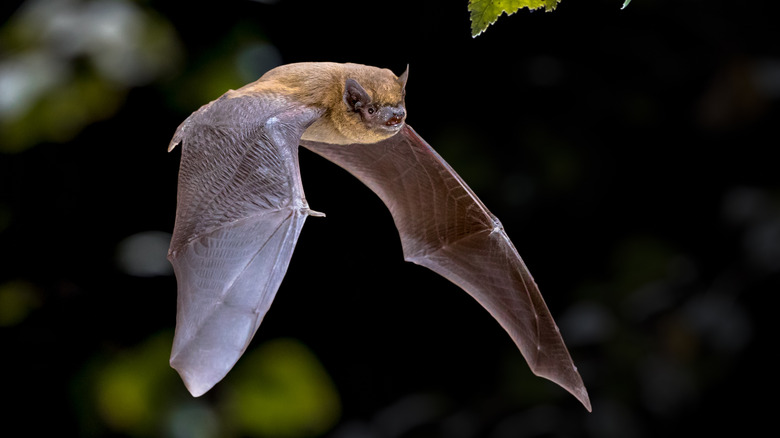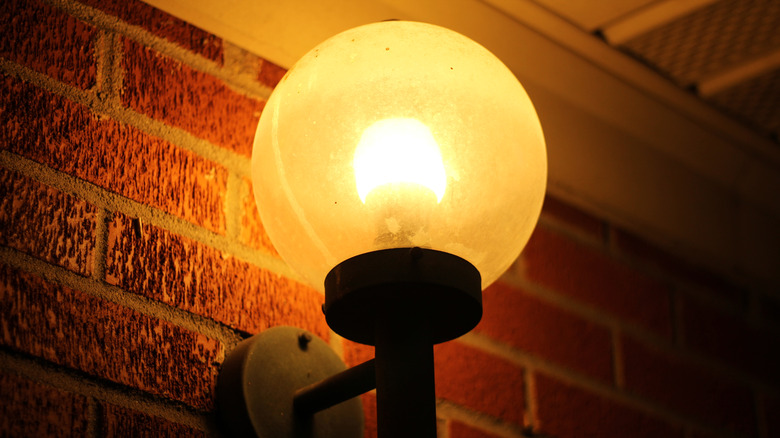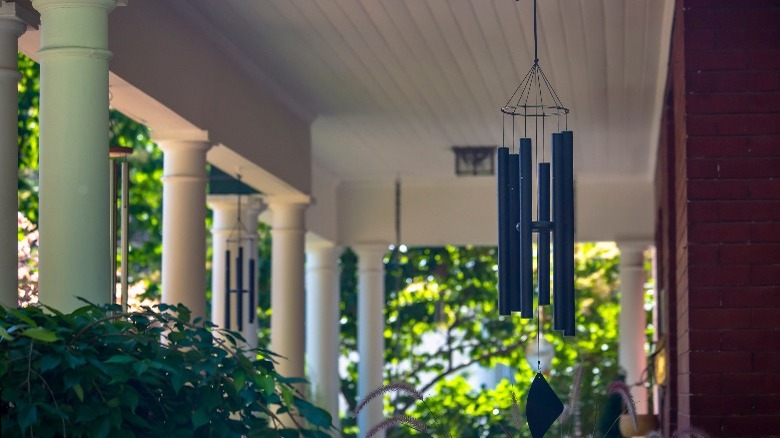How Can You Keep Bats Away From Your Porch And Patio?
Your plain front porch has morphed into a haunted Halloween haven — only the colony of creepy bats isn't made from paper and the holiday is months away. It's a scary scenario that doesn't have to send shivers down your spine. Fortunately, keeping bats away from your porch or patio simply requires installing deterrents that eliminate their food source and irritate their senses.
If you notice bats or bat droppings on your porch or patio, don't automatically assume the menacing winged creatures have found their way into your attic. Bats are similar to overtired parents — all they want is to rest in a dark, quiet area and not be bothered. Consequently, overhangs on porches and patios are the perfect roosting spot for bats looking for a safe place to relax, as the structure shields them from predators such as hawks and owls. That's the bad news. The good news is that bats don't purposely attack humans. It may not seem that way when bats swoop precariously close to your head, but in most cases, they are simply pursuing their preferred food choice — flying insects.
A far more significant concern when seeing bats take up residence on your porch or patio, though, is the risk of diseases. While only a small percentage of bats carry rabies, it's still a threat you want to avoid. Likewise, bat droppings, also known as guano, carry a fungus that can result in serious infections in humans, especially young children and individuals with compromised immune systems.
Install simple bat deterrents
To protect your family from bats, it is essential to make your porch or patio as uninviting to them as possible. Start by robbing the flying mammals of their food source. Bats enjoy feasting on moths, mosquitos, and other flying bugs that are attracted to lights. If you habitually keep your porch or patio illuminated at night, you're essentially providing bats with a free bug buffet to gorge on.
While eliminating outdoor lights may not be realistic, consider swapping out bright white lights with yellow lightbulbs. Doing so will decrease the number of insects flocking to your outdoor space as yellow-tinted lights feature a wavelength insects don't find as enticing as white light. With the insects gone, bats will go elsewhere to hunt down dinner. Additionally, since bats are nocturnal mammals that detest light, flooding your porch or patio with a yellow light will irritate their sense of sight and force them to flee to a darker destination.
Another method to create an unpleasant environment for bats is to inundate your porch with items that aggravate their sense of smell. Bats loathe strong natural odors, including peppermint, thyme, rosemary, cinnamon, and cloves. To keep your patio bat-free, consider spraying mint or cinnamon-based oils in the corners or adding pots or window boxes with fresh rosemary or thyme in spots where you've seen bats perch.
Make your porch or patio uninviting to bats
Bats love perching in dark, cozy areas. Unfortunately, many porches and patios feature rugged materials, such as brick or wood, that make roosting extremely easy for bats. Fortunately, you can fix this by simply installing plexiglass over the areas where you've seen bats congregate. The transparent sheet of plastic creates a smooth surface making it impossible for bats to secure a good grip with their claws and hang upside down.
You can also force bats to flee your porch by scaring them. Given that owls are a bat's natural enemy, consider buying plastic owls and mounting them in the eaves of your outdoor space in full view of your unwelcome fanged guests. If you're fully committed to this deterrent, opt for solar-powered mechanical owls that simulate moves made by actual birds of prey. Otherwise, hang helium-filled Mylar balloons or large pieces of aluminum foil near a bat's resting place. Movements made when the wind hits either reflective item can increase anxiety in bats and prompt them to set up shop somewhere else.
Finally, you can take advantage of a bat's sensitive hearing by annoying them with wind chimes. Aim to install extra-large chimes that feature a clapper and narrow tubes which create high pitch tones. In addition, you can maximize the effectiveness of this deterrent by selecting wind chimes made of shiny metals like aluminum or copper that reflect light and keep bats at bay.


